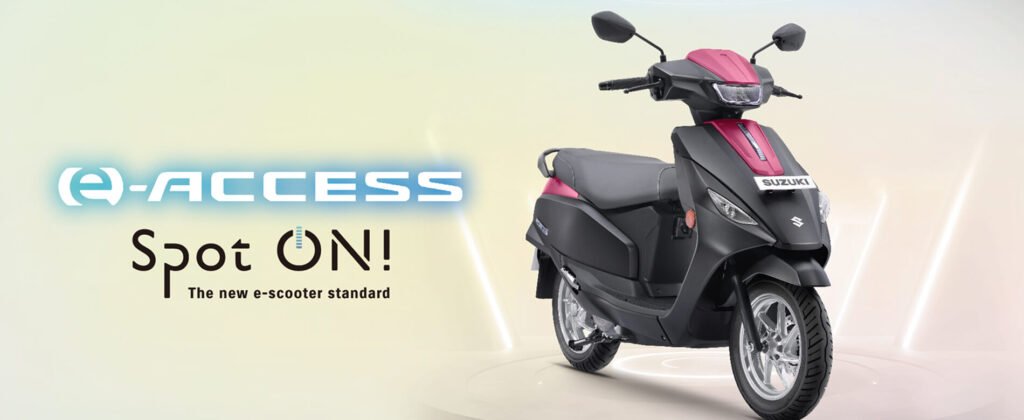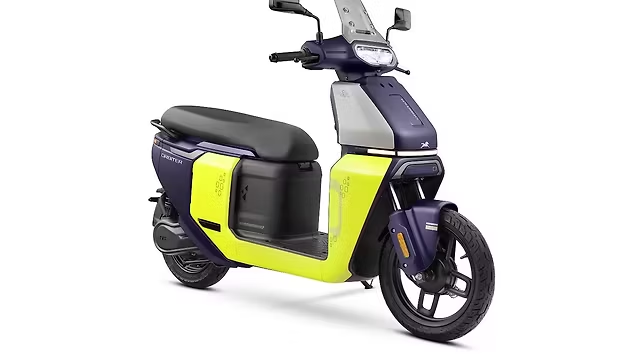TVS Motor Company has officially unveiled its latest electric scooter, the TVS Orbiter, in a virtual launch event today, marking a significant step in expanding its electric vehicle (EV) lineup. Positioned as an affordable, entry-level alternative to the popular TVS iQube, the Orbiter is designed to attract mass-market buyers, particularly young riders and urban commuters seeking a budget-friendly, eco-conscious ride. With a competitive price point and practical features, the Orbiter is set to shake up India’s rapidly growing electric two-wheeler segment.
The TVS Orbiter is priced just below the ₹1 lakh mark (ex-showroom), with estimates ranging between ₹95,000 and ₹1,00,000, making it one of the most accessible electric scooters in TVS’s portfolio. This aggressive pricing strategy pits the Orbiter directly against entry-level competitors like the Ola S1 X, Hero MotoCorp’s Vida VX2, and the base-spec Bajaj Chetak, aiming to capture the attention of price-sensitive buyers in smaller towns and cities.
Design: Sleek, Practical, and ModernThe TVS Orbiter introduces a fresh design language while borrowing subtle cues from its premium sibling, the iQube. Patent filings and teasers reveal a sleek, minimalist aesthetic tailored for urban commuting. Key design highlights include:
- Slim Body Panels: A distinctive design element runs from the front apron through the floorboard, likely housing the battery pack for optimal weight distribution.
- Split Grab Rail and LED Tail Lamps: The rear features a tidy tail section with a modern split grab rail and energy-efficient LED lighting.
- Practical Features: A small glovebox with a charging port adds convenience for daily use.
- Wheel Setup: The scooter sports a 14-inch front wheel and a 12-inch rear wheel, paired with dual rear shock absorbers for a balanced ride.
The Orbiter’s design prioritizes simplicity and functionality, making it an ideal choice for students, office-goers, and families looking for a reliable second scooter.
Specifications and PerformanceWhile TVS has kept full specifications under wraps until the launch, industry insights suggest the Orbiter is equipped with a 2.2 kWh lithium-ion battery pack, delivering a practical range of 70–100 km per charge, ideal for city commutes. The scooter is expected to feature a hub-mounted motor for cost efficiency, though some reports hint at the possibility of a mid-mounted motor for improved balance and performance.
Charging is designed to be user-friendly, with a 0–80% charge time of under three hours, ensuring minimal downtime. Additional features include:
- TFT Digital Display: A basic yet functional digital instrumentation panel.
- Regenerative Braking: Enhances efficiency by recovering energy during deceleration.
- Telescopic Front Suspension: Paired with front disc and rear drum brakes for reliable stopping power.
Unlike the feature-rich iQube, the Orbiter skips advanced connectivity options to keep costs low, focusing on essential functionality for daily riders.
The TVS Orbiter is strategically positioned below the iQube, which starts at around ₹1 lakh and extends to nearly ₹2 lakh for its top-spec variants. By offering a more affordable alternative, TVS aims to capture first-time EV buyers and those transitioning from petrol scooters, especially in the context of rising fuel prices and government EV incentives.
The Orbiter faces stiff competition from budget-focused electric scooters like the Ola S1 X, Vida VX2, and Bajaj Chetak’s entry-level trims. Additionally, Ather’s upcoming low-cost scooter, set to launch just days later, adds to the competitive landscape. TVS’s reputation for reliability and its extensive dealership network (over 8,200 showrooms across India) give the Orbiter a strong foundation to challenge its rivals.
The launch of the Orbiter underscores TVS Motor Company’s commitment to expanding its electric mobility portfolio. With the iQube already a strong player in the premium segment, the Orbiter broadens TVS’s reach into the entry-level market, catering to a wider audience. The company is also investing heavily in charging infrastructure, battery technology, and software-driven services to support its EV ecosystem.
There’s also speculation about a potential Battery-as-a-Service (BaaS) model, which could further reduce upfront costs and make the Orbiter even more accessible to price-sensitive buyers.



